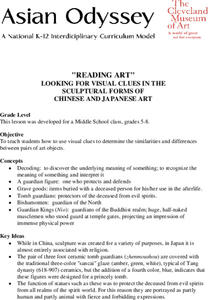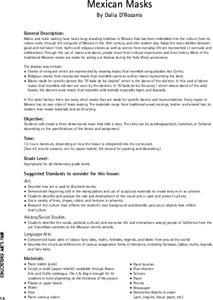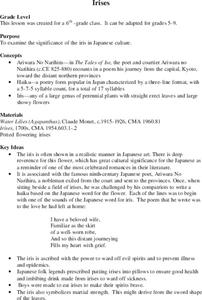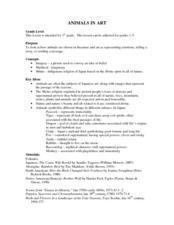Curated OER
Durga's Victory: Envisioning Power
Young scholars read a selection about the Hindu deity, Durga. They analyze an image of her and discuss what it means to be "powerful."
Curated OER
Demon Masks
Students, using a story for inspiration, create their own demon mask. They are to use lots of color, texture and imagination.
Curated OER
Reading Art
Students compare and contrast different works of Asian sculptural forms and use visual clues to analyze those works. Evaluation for this lesson is done on the second class day with each student creating a drawing of an American sculpture.
Curated OER
Chinese And Japanese Tomb Cultures
Students examine burial customs in ancient China and Japan comparing those customs to burial traditions from other cultures. This lesson leads to group creative projects of mock "tombs".
Curated OER
Belief Systems of the Silk Roads
Students review, compare, and contrast belief systems of the Silk Roads. They analyze primary texts of sacred and philosophical writings. Finally, students recognize the rich diversity of belief systems along the Silk Roads.
Curated OER
Discussion Questions about Human Nature
Learners explore the different types of heros in American history.
Curated OER
Managing the Teaching-Learning Process
Twelfth graders begin to recognize how 2,400 year-old dramas are applicable to their lives after reading OEDIPUS THE KING, AGAMEMNON, ANTIGONE, MEDEA, HIPPOLYTUS, and FROGS.
Curated OER
Mexican Masks
Students explore the Mexican mask-making tradition and create maks that tell stories. They desribe how art tells stories and examine early Mexican culture in California.
Curated OER
Japanese Family Crests
Pupils create an artistic crest that represents either themselves, their group of friends, or their their family.
Curated OER
Irises
Students create realistic and impressionistic drawings of irises in an attempt to better understand the importance of the iris in Japanese culture and art. Lesson extensions are provided for this one day lesson.
Curated OER
Yin And Yang
Students examine the symbols of change, Heaven and Earth, as expressed in
Chinese art and literature in this High School lesson. Evaluation is accomplished through a short, small-group research project.
Curated OER
Dragons In Chinese Folktales And Art
Students investigate and discuss the use of the dragon in Chinese folktales and art in this middle school lesson plan introducing Chinese art and culture. Lesson extensions are included for additional activities.
Curated OER
Animals in Art
Young scholars look at how animals are shown in literature and art as representing emotions, telling a story, or sending a message in this elementary school Language Arts and Visual Arts lesson.
Curated OER
Japanese Folktales for Children
Students study Japanese folkart traditions and culture through storytelling, class discussions, and a creative project. The project involves students creating drawings of a pre-selected folktale and putting them together in a class book.
Curated OER
The Role of Dragons in Chinese Culture
Students discuss the concept of symbolism in China and America and create their own "dragon boats" for evaluation and display. This Art lesson can be easily integrated into an elementary unit on China.
Curated OER
Frame Animation
Students examine the idea that an object might never have a "fixed" existence and may be a thing existing always in flux by creating a frame-based animation of something that transforms from one shape into another. They create...
Curated OER
Human Rights
Pupils explore the importance of laws and the need to speak up against wrong doing and how to bring change in society and in the law. They discuss the needs and concerns of others. Students explore the concept of bias and prejudice. They...
Curated OER
Diwali
High schoolers participate in the retelling of a story. After reading the story Diwali, students working in groups retell the significant events in the story through role play. In addition, they discuss the significance of the Hindu...
Curated OER
Fighting Back
Young scholars identify different methods of resistance used by Jews during the Holocaust and classify them as either passive or active forms of resistance. They create a role play of a husband and wife on whether they should hide a...
National First Ladies' Library
Birds of a Feather: Parrots, Pigeons, Parakeets, and More
High schoolers investigate the concepts related to the extinction of birds while conduct research using the internet and a variety of resources. The information is used in order to create a class presentation or set the context for class...
Curated OER
Test Your Vocabulary Skills- Abstract Nouns 2
In this vocabulary worksheet, students recall that an abstract noun is a noun that does not have a physical form. Students write a matching abstract noun for a list of twenty adjectives.
Curated OER
Simulation: Connecting Osiris
Students identify Ancient Egypt as the origin of the idea that moral worth as the key to eternal life. In this Ancient Egypt lesson plan, students discuss immorality or eternal life. Students then work the Osiris puzzle and discuss the...
Curated OER
The Probability that God Exists
In this probability worksheet, students are presented with how a scientist calculated the chance that God exists. References to scientists, mathematicians, and books are made.
Other popular searches
- Theme Good vs. Evil
- Beowulf Good vs. Evil
- Folktales Good vs. Evil
- Theme Good vs Evil
- Good vs. Evil Philosophy
- Folktales Good vs Evil
- Good vs. Evil Scenarios
- Good vs. Evil Art
- Good vs. Evil r.e
- Good vs Evil Art
- Good Versus Evil Theme
- Good vs Evil Religion
























